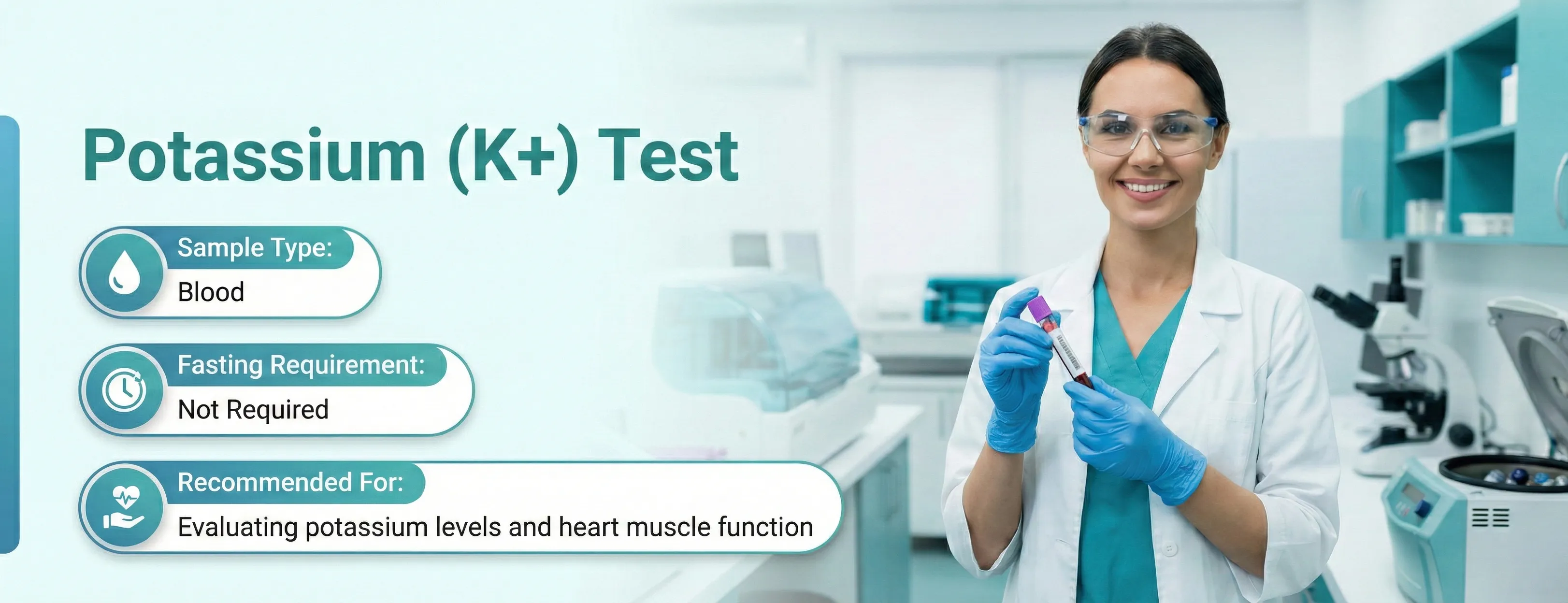5656+ orders placed in your location
100% NABL & ISO Certified Lab • 100% Accurate Reports
Potassium (K+) Test
Serum Potassium, Serum K, Serum K+
- SummaryThe Potassium (K⁺) Test measures the level of potassium in your blood, which is essential for proper nerve function, muscle contraction, and heart health. Abnormal potassium levels may indicate kidney disorders, dehydration, arrythmia or the effects of certain medications. This test uses a blood sample, does not require fasting, and is suitable for all age groups as recommended by a healthcare provider.Read more
- Reports Within12 HrsView Sample Report100% NABL & ISO Certified Labs
- SampleBlood
- AgeAll Age Group
- GenderMale and Female
- FastingNot Required
PharmEasy Promises
Know More About The Test
A quick info on Potassium (K+)
Overview
Serum Potassium is a blood test commonly performed as a part of an electrolyte panel or as a part of routine checkup. Serum Potassium levels give an assessment of heart health and kidney function.Abnormal Potassium levels affect the heart, muscles, and nerve function.
Your doctor may recommend testing potassium levels at regular intervals. A regular Serum Potassium Level test, may be advised if you have diabetes or hypertension or are on certain medications that affect potassium levels.
Low potassium levels may cause weakness, muscle cramps, or constipation. In severe cases, it can cause arrhythmia ( irregular heart rhythm). These can potentially be fatal and require urgent intervention. In case of any such symptoms with low potassium levels, visit your doctor immediately.
High potassium levels can cause arrhythmias and muscle weakness as well. They can also cause severe pain in the abdomen, diarrhoea, and nausea. Mild cases may have no symptoms at all. Severe cases may require frequent testing and additional testing, including an electrocardiogram.
Sample Type
A simple venous blood sample is sufficient to test potassium levels in the blood. The levels are detected in the serum, which is a component of the blood. This sample may be drawn from any of your prominent veins, the most common being the vein in your arm. It does not require any prior preparation.
Risk Assessment
Electrolyte Panel, Kidney Function, Heart Function
What does this test detect?
In very simple terms, potassium is an electrolyte found in the body that is normally excreted by the kidneys. A serum potassium test detects the level of this electrolyte in the blood. In specific cases, the levels of this electrolyte can also be tested in the urine. Potassium levels are regulated by several hormones.
Indications for Potassium (K+) Test
- Most commonly, the test is just a part of a routine electrolyte panel or metabolic panel to ensure that your kidneys are working optimally.
- Depending on your associated health problems, your doctor may advise the test if you have diabetes or hypertension.
- It is also required to be done periodically in case of consumption of several drugs.
How frequently should you take this test?
The test is a part of a routine examination. In case you have diabetes or kidney disease, you may be required to perform the test more frequently. In case you have complaints such as muscle cramps, palpitations, and arrhythmias, your doctor may advise you to get your serum potassium levels checked.
Test Preparation
Before the Test
Generally, no special test preparation is required before an Serum Potassium levels test. However, if this test is done in conjunction with another test, your physician may ask you to avoid certain food items. In order to get the most accurate results, it is necessary to consult a medical professional before taking the test.
During the Test
A phlebotomist will draw blood from a vein in your arm to collect a sample. Your experience will be something like this:
- The area where the needle will be inserted is cleaned with antiseptic lotion.
- A tourniquet band is tied around the arm to dilate the veins.
- A new syringe needle will be inserted into the vein to draw blood. This procedure may take a few seconds, during which you may feel a slight pain of needle pricking.
- Your blood sample will be stored in a small vial or test tube with your test details.
After the Test
Once the blood is collected:
- A sticking plaster is applied to the needle insertion site to prevent bleeding.
- There may be a slight soreness or lightheadedness in some cases, nothing to worry about. You may be asked to sit for a few minutes.
- Contact your doctor if there is bleeding, pain or rashes at the puncture site.
Parameters
Serum potassium is an individual test. It only measures the levels of a single electrolyte, that is, potassium.
Ranges
The standard levels of serum potassium for adults lie between 3.5 and 5.1 millimoles per litre (mmol/L).
The normal values and reference ranges of the test may vary from lab to lab. Please refer to the ranges mentioned in the report and consult a doctor to understand the interpretation of lab reports.
Levels above 5.5 mmol/L are referred to as hyperkalemia. Levels over 6.0 mmol/L can be life-threatening and require immediate medical attention. Levels below 3.5 mmol/L are referred to as hypokalemia. Lower levels below 2.5 mmol/L can be fatal and need monitoring and urgent treatment.
Test Result Interpretation
Women are more likely to develop low levels of potassium. Serum potassium levels above normal are referred to as hyperkalemia. Levels below the normal range are referred to as hypokalemia.
Electrolyte levels are significantly affected by the ability of the kidney to function well. The causes of high potassium levels include:
- Acute or chronic kidney disease. Any kind of kidney failure can disrupt serum potassium levels.
- Diseases of the adrenal gland such as Addison’s disease. The adrenal is a gland that lies on top of the kidneys and is largely responsible for producing hormones that regulate the stress response and blood pressure. It also plays a level in determining metabolic rate and regulation of electrolyte levels.
- The use of drugs such as beta-blockers, angiotensin receptor blockers or ACE inhibitors. These drugs are usually prescribed to control hypertension but have numerous other indications. In case you are on these drugs, your doctor may prescribe electrolyte tests as a part of routine monitoring.
- Unregulated use of potassium supplements may also elevate your blood potassium levels.
There are several causes of a low potassium level. These include:
- Excessive alcohol intake
- Acute or chronic kidney disease
- Use of prescription drugs known as diuretics that increase the production of urine. These result in increased urine output and, consequently, increased potassium loss.
- Diabetes, especially in case of severe complications such as diabetic ketoacidosis.
- Excess fluid loss in case of increased sweating, vomiting, or diarrhoea.
- Deficiency of folic acid
- Syndromes such as Cushing’s syndrome, Bartter syndrome, and Gitelman syndrome are related to lower levels of potassium.
It is important to remember that derangements in potassium levels have several findings in common. These include:
- Variable response in kidney disease. When your kidneys are not functioning correctly, this may result in high or low potassium levels. Serial assessments of potassium levels may be required.
- The symptoms are often overlapping and difficult to differentiate clinically. Changes in your pulse rate, ECG and rhythm are common to hypokalemia and hyperkalemia. Similarly, muscle weakness, fatigue, and changes in bowel habits are findings that may be confusing. In this case, do not try any kind of self-medication, even if you have experienced such symptoms before. Always consult your doctor at the earliest, who will advise you on the required testing and management.
Risks and Limitations
The Serum potassium levels is a common blood test with a very low risk of complications. Seek medical advice right away if you notice-
- Excessive bleeding following the needle insertion.
- Discomfort or swelling at the insertion site.
Limitations of the test
- Negative impact on the outcome of the test due to equipment or human errors.
- Wrong understanding of the markers.
Was This Test Information Helpful?
Please rate your experience
References
People Also Ask
Are there any steps I can take to increase my potassium levels?
What happens when potassium is high?
What is low potassium in a blood test?
How do you feel when your potassium is low?
Can potassium levels be checked at home?
Have any doubts? Ask us.
Ask us anything about the Potassium (K+) Test to understand it better
We provide trusted, expert-curated health content to support better awareness,prevention, and care.
Backed by experienced doctors, medical experts, and strict editorial standards.


